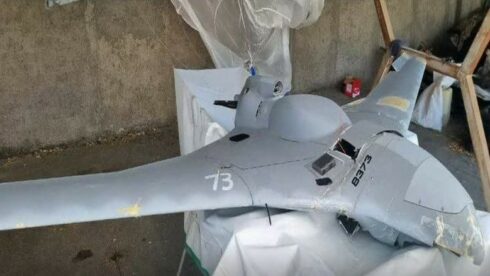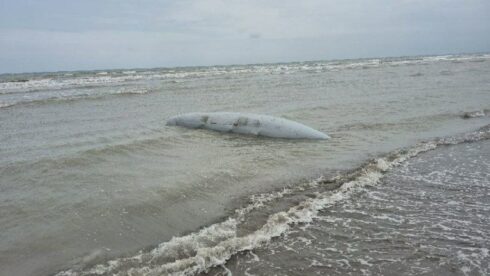Tensions are mounting between Iran and Azerbaijan amid suspicions in Tehran that Baku allowed the Israeli military its airspace to carry out recent strikes on Iranian territory during the recent 12-day war.
Israel began the war on June 13, stating that its goal was to cripple Iran’s nuclear program. A ceasefire was suddenly announced on June 24, just two days after the United States joined the war by attacking three key nuclear sites in the Islamic Republic.
On June 28, Iran’s Ambassador to Armenia, Mehdi Sobhani, revealed that Tehran had asked Baku to conduct a thorough investigation into whether Israeli drones entered Iranian airspace from Azerbaijan during the war.
“We do not confirm some of the information and reports published by certain sources in this regard… Once all aspects of the situation become clear, we will decide on our response,” the ambassador said during a press conference at the National Press Club in Yerevan, according to Fars news agency.
“We have not permitted Iranian territory to be used for such purposes. If Azerbaijan has granted such permission, it must provide an explanation in accordance with international law,” he added.
Sobhani said Iranian intelligence has received information indicating that a small number of Israeli drones crossed into Iran from neighboring countries.
As a result, he said, Iran’s President Masoud Pezeshkian raised the issue in a phone call with his Azerbaijani counterpart, Ilham Aliyev, requesting a serious investigation.
Azerbaijan has assured Iran that it would not allow its territory to be used against it, according to Sobhani, who emphasized that Tehran needs to receive accurate information before responding.
There is evidence indicating that Israel may have launched or just operated drones out of Azerbaijan. For example, the wreckage of an Orbiter 4, an Israeli reconnaissance drone with a limited range, was found in western Iran. Azerbaijan produces this type in partnership with Israel.
Iranian media made even more serious accusations during the war, reporting that Israeli fighter jets used Azerbaijani airspace, particularly over the Caspian Sea, to carry out strikes on Tehran and other areas in the center of the Islamic Republic.
At least one F-15 drop tank washed off the Iranian shores on the Caspian Sea after the end of the war, which shows that these accusations have merit.
While it is highly unlikely that Israeli fighter jets took off from Azerbaijan, they may have refueled there on the air or even on the ground before heading back.
Azerbaijan is one of the main defense partners of Israel. The support of Israel was critical for the Azerbaijani victory in the Second Nagorno-Karabakh War with Armenia in 2020.
And while Baku maintains somewhat decent relations with Tehran, its media has been upping the criticism of Iran and its leadership.
In an editorial published recently by the Azerbaijani news outlet Caliber, the writer claimed that “Iran’s primary enemy is not an individual official or diplomatic actor, but Supreme Leader Ali Khamenei himself.”
The piece accused Khamenei of spearheading a long-standing “hostile and subversive policy” toward Baku, claiming that every anti-Azerbaijani provocation and leak of sensitive information could be traced back to his office. “This is not a series of isolated incidents,” the article stated. “This is an ideology — and its architect is Ali Khamenei.”
The tensions between Iran and Azerbaijan could lead to a conflict. Tehran, which is still recovering from the war, will not likely initiate any action, but Baku could. In recent years, the Azerbaijani leadership has shown a will to play a larger regional role, and a conflict with Iran could serve its Israeli allies.
_______________________________________________________________________________________________________________________
SouthFront: Analysis and Intelligence
NOW hosted at southfront.press
Previously, SouthFront: Analysis and Intelligence was at southfront.org.
The .org domain name had been blocked by the US (NATO) (https://southfront.press/southfront-org-blocked-by-u-s-controlled-global-internet-supervisor/) globally, outlawed and without any explanation
Back before that, from 2013 to 2015, SouthFront: Analysis and Intelligence was at southfront.com









azerbaijan president is slave of israel we all know alivey is using whbahi scum to oppress people in azerbaijan mostly shia who r align with iran islamic leaders . and alivey is trechourous person . if azerbaijan do anything silly destroy that city of baku simple . iran president has to warn azerbaijan president come to his sense or will pay .
russia also has a case to destroy baku, they need teaching a lesson.
putin won’t do anything against turkey or israel.
turkey and azerbayan have close ties with israel, usa and nato, both play in the same team targeting russia and iran, of course azerbajan is nothing in the moment that georgia or even russia close the gas&petrol pipelines through georgia which are supplying gas to eu. but russia is ruling by a business manager while iran by religious ayatollas which dont want foreign bases in its territory
wrong, zionists want to provoke conflict between turkey and russia through their puppets in azerbijan
i was reading the several interlinked articles over on wikipedia, looks like good fashioned greed has taken over this country. the azeri presidents wife is shia for crying out loud! just more “elitest” bull crap like here in the states.
his wife is israeli, his children are – where do you think his money comes from?
nasty turds–never trust a sleazy turd
100% correct. azeri is led by one of the largest hook noses in history. they operate mossad outposts like the kurdish do. azeri needs to be contained, they are a hostile country to iran and russia with their pro israel regime and have revanchist claims on iran and armenia. aliyev clan has zionist insiders, i know this for a fact. they use silk air to transport weapons to syrian wahhabis. regime change in azeri to come
azerbaican is khazaria leftovers
you are wrong. don’t cut your friends when you need each other. azeris are mostly muslims bound to iran. trough sovietunion time their government got corrupt. but azeri is the exact opposit of khzari.
azerbaijan is ruled by the israeli mafia and this is no secret, aliev is a fanatical zionist. the zionist entity in azerbaijan is working against both iran and russia, their existence must not be tolerated! russia and iran should cooperate to neutralize the ultra-zionist turkoid genocidal threat coming from the terrorist regime in azerbaijan!
yes, azerbaijan is innocent of this…in a pigs eye. they’re also ‘innocent’ of aiding in/assassinating raisi. looks like the khazarians are rebuilding their empire. they rely on traitors across the world who will subvert their own countries to them. israel has compromised every state bordering on russia or iran. gee, i wonder why?
iran is just another unfortunate victim of russian betrayal. due to soviet betrayal of the congo, the honest handsome black patriot patrice lumumba, was brutally tortured and killed. the soviet union also betrayed afghanistan and then, fortunately, collapsed, otherwise the betrayals would have continued. germany did not betray croatia, and that is why ante gotovina was released from the hague prison, but milošević was killed there.due to russian betrayal, nagorno-karabakh became part of azerb
not even azerbaijan fears iran or russia…heheheh
γελας και..στον υπνο σου ??
russia and iran should address the azerbaijan problem eventually. how hard could it be. azerbaijanis are only ten million, russians over 146 million and iranians over 92 million. it would only take like 2 weeks to finish off the azeri armed forces and split up the spoils.
aliyev should be targeted in a decapitation strike and russia should intensify its support to haftar to go on the offensive in libya. erdogan’s hatchlings need to be eliminated with extreme prejudice while they are still in the egg, to prevent more jolani’s appearing
it could have been russia that let them use their airspace or anyone else. what surprises me about the epstein operation was that people don’t look further than the us for influence peddling. all of those leaders in the area would have been targeted for blackmail operations and i guarantee the mossad got to a couple of them and honestly probably most of them.
just the old old story. a moslem country stabbing another moslem country in the back.
greedy bastards and bitches.